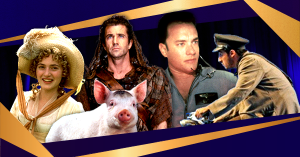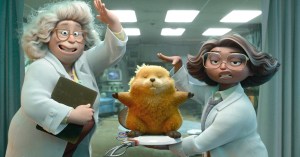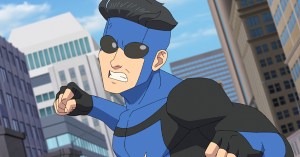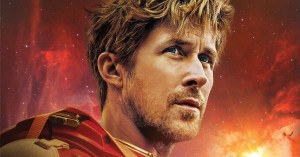Emma Stone’s 10 Best Movies
In this week's Total Recall, we count down the best-reviewed work of the Amazing Spider-Man 2 star.
She’s only a few years past legal drinking age, but Emma Stone has already been wooed by Jonah Hill, voiced a homo erectus teen, and battled zombies — and this weekend, she’ll make her second appearance as Gwen Stacy in Marc Webb’s rebooted Amazing Spider-Man saga, so now seems like a pretty good time to take a look back at some of the brighter critical highlights from her growing list of film credits. We’re romancing the Stone, Total Recall style!
Matt Atchity breaks down this week’s list.
10. Gangster Squad
It wasn’t supposed to be this way for Gangster Squad. With a fact-based screenplay inspired by the LAPD’s efforts to take down notorious scofflaw Mickey Cohen (Sean Penn) and a terrific cast bolstered by the presence of some of Hollywood’s hottest young actors (including Stone, Ryan Gosling, and Anthony Mackie) as well as a handful of savvy vets such as Nick Nolte and Josh Brolin, this should have been a crime thriller for the ages; alas, the movie’s fate seemed doomed from the start. A public shooting whose details bore an unfortunate similarity to an event in the plot prompted a four-month delay that ended up exiling the movie to the January graveyard — which was just as well for critics, the majority of whom found it to be underwritten and excessively violent. Still, if you’re looking for a gangster flick with old-fashioned morals, you could do worse; as Dave White wrote for Movies.com, “Here, the good guys win, the bad guys earn their comeuppance, the dames look pretty and the dopey dialogue shoves a grapefruit in your face and shuts you up.”
9. The House Bunny
It sounds like the kind of movie that should star a Wayans brother in drag: The House Bunny follows the bubbly adventures of an exiled Plaboy Playmate (Anna Faris) who latches onto a gaggle of unpopular sorority sisters and ends up learning a lot — as well as teaching her new friends a few things — about life, love, and self-respect. With a plot that mashes up a gender-reversed Revenge of the Nerds against any coming-of-age comedy you could mention, it’s no surprise that The House Bunny failed to woo many critics, but largely thanks to its immensely appealing cast, the movie has become something of a cult favorite over the last few years; as far as Salon’s Stephanie Zacharek was concerned, it “gets the difference between being openhearted and empty-headed.”
8. The Rocker
Given how adroitly Rainn Wilson embodied the spirit of incompetence-fueled arrogance during his run as Dwight Schrute on NBC’s The Office, asking him to play a freakishly intense man-child in The Rocker must have seemed like a great idea on paper. And actually, Wilson’s performance is the least of this 2008 comedy’s problems — he, like the rest of the cast (including Stone as a member of the teen band Wilson’s character ends up drumming for after he’s fired, Dewey Finn style, from the group he founded), does exactly what he’s asked to do. Unfortunately, no one’s asked to do enough to differentiate The Rocker from similar (and funnier) comedies; as Elliott Noble pointed out in his lukewarm review for Sky Movies, “Essentially covering the same playlist as Jack Black’s School of Rock, The Rocker is a good-natured, live-the-dream lark in which the one-liners score hits but the slapstick continually misses.”
7. The Croods
Given Nicolas Cage’s track record, you could tell someone he and Emma Stone co-starred in a movie in which they played characters named Grug and Eep and had to contend with prehistoric creatures, and it would be perfectly logical to ask whether the film in question was an intentional comedy. Happily, The Croods boasts plenty of genuine laughs to go along with its colorful animation, thanks to a sweet story about a caveman patriarch (Cage) whose willful daughter (Stone) spurs an adventure into the outside world. A massive worldwide hit and eventual launchpad for a new DreamWorks Animation franchise, it is also, according to the Minneapolis Star Tribune’s Colin Covert, “the kind of rib-tickling, emotionally satisfying, universally appealing effort that gives computer animation a good name.”
6. The Amazing Spider-Man
Outside the Sony Pictures offices, very few people truly believed the Spider-Man franchise really needed a reboot in 2012, but we got one anyway. Fortunately, even if it couldn’t escape the familiar confines of a character mythology that had only recently been explored in Sam Raimi’s Spider-Man trilogy, Marc Webb’s The Amazing Spider-Man had a few things going for it — including an impressive cast that boasted Martin Sheen, Sally Field, Rhys Ifans, and as Peter Parker’s (Andrew Garfield) doomed young love interest Gwen Stacy, Emma Stone. Without such dependable stars, it’s questionable whether audiences would have been quite as willing to shell out for another return to Spider-Man’s roots; as it was, the Atlantic’s Christopher Orr spoke for many of his peers when he wrote, “The Amazing Spider-Man is considerably more fun — and, yes, even touching — than so premature a reboot had any right to be.”
5. The Help
Adapted by writer-director Tate Taylor from Kathryn Stockett’s bestseller, The Help looks at ’60s Southern racism through the eyes of young journalist Skeeter Phelan (Stone), whose youthful idealism spurs her to mount a writing project that gives local maids an opportunity to expose their systematic mistreatment at the hands of the upper class — and which ultimately wreaks all manner of havoc in the relationships in and around Skeeter’s own family. A $211 million global smash, The Help picked up four Academy Award nominations, including a Best Supporting Actress win for Octavia Spencer, and enjoyed a largely positive critical response. “The movie isn’t perfect,” admitted Entertainment Weekly’s Owen Gleiberman, “it sometimes shows its stitching. But mostly it’s a stirring salute to subjugated women who hold their heads high.”
4. Crazy, Stupid, Love.
A year after breaking out in the high school comedy Easy A, Stone graduated to more adult rom-com fare with Crazy, Stupid, Love. Playing the slightly neurotic target of a Lothario (Ryan Gosling) whose suave exterior masks unsuspected sensitivity, Stone added a layer of adorable sweetness to the dark drama in the movie’s other storyline, which follows a middle-aged bachelor (Steve Carell) on his adventures through his unwilling re-entry to the dating pool after discovering that his wife (Julianne Moore) wants a divorce. Neither of its plot strands are particularly original, but the cast is charming, and as Bob Mondello joked for NPR, “In a genre where outright imbecility generally prevails, a film investigating craziness and stupidity qualifies as a cut above.”
3. Easy A
By the time Easy A came out in 2010, Emma Stone was a few weeks away from turning 22, and as a genre, the teen comedies that inspired director Will Gluck seemed just as dated as his star. But as it turned out, Stone could still play a fairly convincing high school student, and Gluck’s gleefully referential script — which openly paid homage to Ferris Bueller’s Day Off, among other John Hughes classics — helped breathe new life into a story that re-imagined Nathaniel Hawthorne’s The Scarlet Letter one more time. Starring Stone as teen misfit Olive Penderghast, Easy transplants the source material’s tale of misguided morality to a modern high school ruled by a popular prude (Amanda Bynes) whose vengeful gossip inspires Olive to take rumors into her own hands. Effectively serving as Stone’s leading-lady coming-out party, Easy A scored with audiences as well as critics like ReelViews’ James Berardinelli, who decreed that it “belongs in the company of Election, Heathers, and Mean Girls — all motion pictures that have outlived their theatrical lives because they have unique voices and use them to say something.”
2. Superbad
Watching Superbad, you can kind of tell that co-writers Seth Rogen and Evan Goldberg wrote their first draft of the screenplay when they were 15 — and that’s a good thing. Relying more heavily on sharp R-rated humor than gratuitous T&A, the movie follows the increasingly desperate efforts of graduating pals Seth (Jonah Hill) and Evan (Michael Cera) to score at a party being thrown by the popular girl (Emma Stone) that Seth secretly pines for; of course, this being a teen comedy, just getting to the party turns into a horrific (and hellaciously funny) ordeal that includes a pair of incompetent cops (played by Rogen and Bill Hader) and the most memorably incompetent fake ID in recent cinematic history (sported by Christopher Mintz-Plasse, who will forever hear cries of “McLovin!” whenever he steps out in public). “Even if Superbad‘s not much more than a teen comedy, it’s the best teen comedy to come out in at least a decade,” argued Paste Magazine’s Sean Gandert. “There’s no shame in that.”
1. Zombieland
With the number of zombie movies that have been released, any new entry in the genre really has to do something different in order to stand out — and that’s just what Ruben Fleischer did with Zombieland, starring Woody Harrelson as a cynical survivalist prowling post-outbreak America in search of a Twinkie, Jesse Eisenberg as a college student whose meek exterior masks a surprisingly effective zombie killer, and Emma Stone and Abigail Breslin as a pair of sisters who join them on their journey to a California amusement park that’s rumored to be zombie-free. Toss in one of the most excellent celebrity cameos in recent memory, and it all added up to a $100 million hit — and the movie Roger Moore of the Orlando Sentinel described as “the funniest zombie movie since Shawn of the Dead, funnier even than Fido” as well as “a 28 Days Later played for laughs — lots of them, endless jokes, one-liners and sight gags.”
In case you were wondering, here are Stone’s top 10 movies according to RT users’ scores:
1. The Help — 89%
2. Superbad — 87%
3. Zombieland — 86%
4. The Amazing Spider-Man — 78%
5. The Croods — 78%
6. Easy A — 77%
7. Crazy, Stupid, Love. — 77%
8. Gangster Squad — 58%
9. The House Bunny — 51%
10. Paper Man — 49%
Take a look through Stone’s complete filmography, as well as the rest of our Total Recall archives. And don’t forget to check out the reviews for The Amazing Spider-Man 2.





